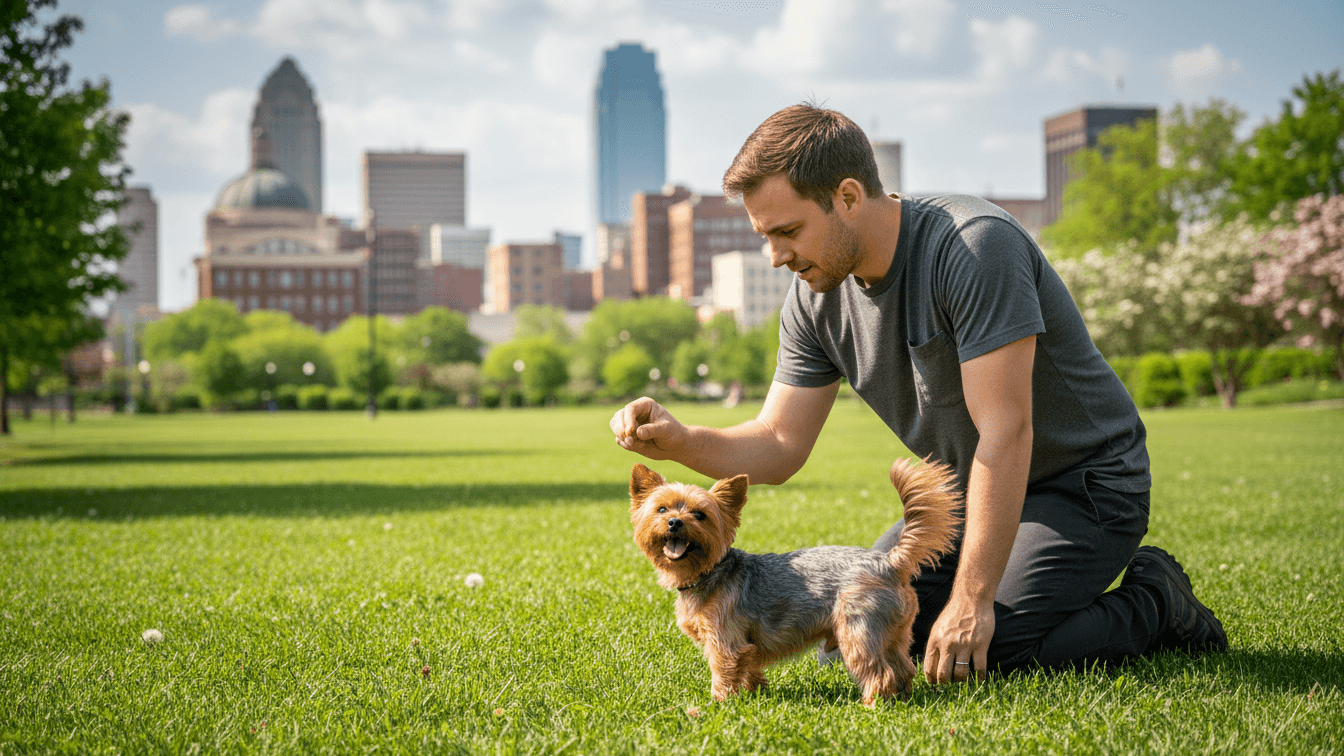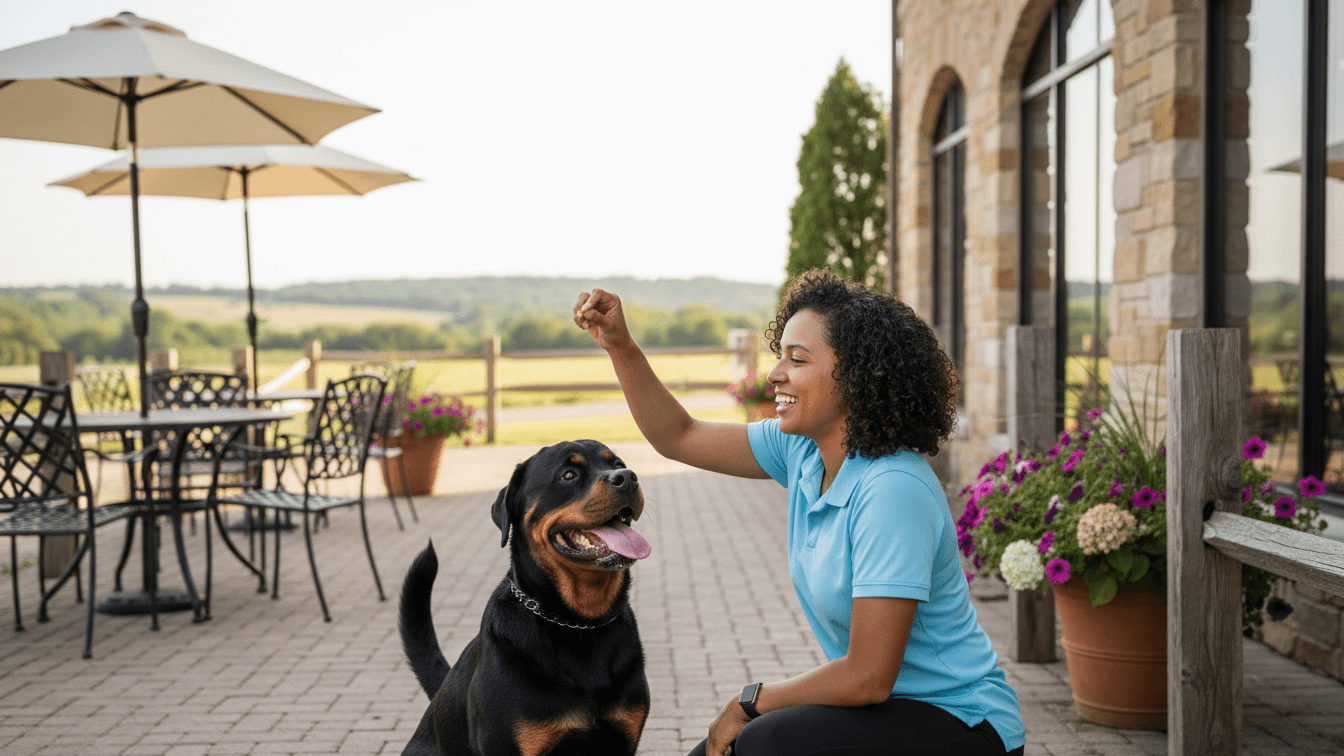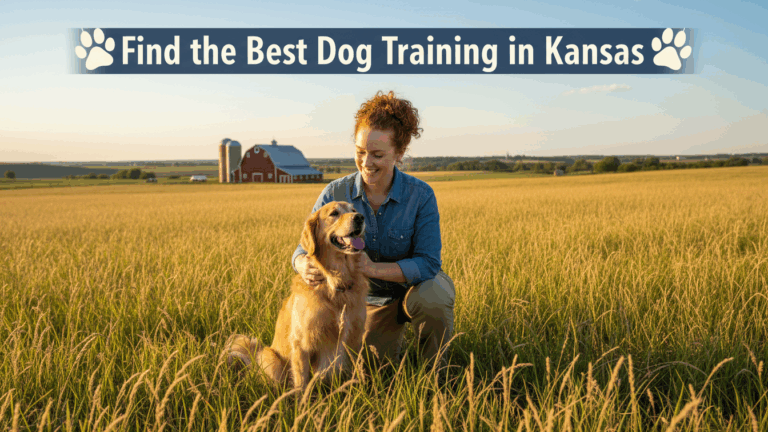Your Complete Guide to Choosing a Dog Trainer in Kansas
Finding the right dog trainer in Kansas means looking for someone who understands both your training goals and the unique aspects of life in the Sunflower State. From busy city sidewalks in Wichita and Overland Park to rural town squares and prairie trails, your dog needs to handle a wide variety of environments calmly and confidently.
Kansas dog owners face specific challenges that go beyond basic obedience. Your dog might need to stay calm around livestock on rural properties, handle summer storm anxiety common across the Great Plains, or navigate busy farmers markets and community festivals without pulling or jumping. The right professional dog trainer will help you build these real-world skills while respecting your lifestyle and your dog’s individual temperament.
How to Choose the Right Trainer
Start by looking for someone who uses positive reinforcement training methods and has verifiable credentials. Common dog trainer certifications include CPDT-KA, KPA-CTP, or IAABC-CDBC for behavior issues. If your dog shows serious aggression or fear, look for a certified dog trainer with CBCC-KA or similar advanced credentials.
Think about your specific goals before you start calling trainers. Do you need help with a new puppy who’s learning house manners and socialization? Are you working on leash reactivity for walks through your neighborhood? Does your dog need advanced skills for public access or therapy work?
In-home dog training works best for door manners, house training issues, and neighborhood leash skills because your trainer can address problems exactly where they happen. Group classes make sense once your dog can focus around distractions, and they offer valuable socialization opportunities. Board and train programs can jumpstart progress quickly, but make sure you understand how the trainer will teach you to maintain those skills after your dog comes home.
Ask whether the trainer offers a free consultation or evaluation session. This gives you a chance to see how they interact with your dog, explain their training program, and answer your questions about their approach.
Common Dog Training Methods Explained

Reward-based methods build trust and create lasting behavior changes without damaging your relationship with your dog. These approaches also help you stay compliant with local animal control ordinances about keeping dogs under control in public spaces.
Basic obedience covers sit, down, stay, come when called, loose-leash walking, and place training. These foundational skills give you the tools to help your dog succeed everywhere from veterinary visits to downtown shopping districts.
Puppy training focuses on socialization during critical developmental windows, potty training, bite inhibition, crate comfort, and early leash skills. Starting young prevents problem behaviors from forming and sets your puppy up for a lifetime of good manners.
Behavior modification addresses fear, reactivity toward other dogs or people, separation anxiety, resource guarding, and other complex issues through systematic desensitization and counterconditioning. This specialized work requires patience and expertise, so look for trainers with advanced education in applied animal behavior.
Private lessons let you customize everything around your specific challenges and schedule. Your trainer can work with you at home, then transition to practicing in real-world locations like parks, parking lots, or walking trails.
Dog training classes provide structure and socialization opportunities. The best group classes screen participants carefully, give dogs enough space to learn without feeling overwhelmed, and focus on building calm, thoughtful behavior rather than excitement.
Service dog training and therapy dog training require much more precision and public-access skills than basic obedience. If you’re pursuing either path, find a trainer who specializes in that area and understands the legal and practical requirements involved.
Avoid any trainer who relies on fear, intimidation, pain, or dominance theory. These outdated methods create unnecessary stress and can make behavior problems worse over time.
Average Cost of Dog Training in Kansas (Updated for 2025)
Prices across Kansas vary based on the trainer’s experience, location, session length, and type of service. Urban areas like Johnson County, Sedgwick County, and Shawnee County tend to run slightly higher than rural communities, but quality training is available throughout the state.
| Service Type | Average Cost (Kansas) |
|---|---|
| Puppy classes (4-6 weeks) | $140-$260 total |
| Group obedience classes (4-6 weeks) | $150-$280 total |
| Private lessons (60-90 min) | $100-$175 per session |
| In-home training packages (4-6 visits) | $400-$850 total |
| Board and train (2-4 weeks) | $1,800-$4,200 total |
| Behavior consultation (initial) | $125-$225 |
| Day training per week | $400-$900 |
Some trainers charge travel fees for longer distances, especially in rural areas. Behavior modification for reactivity, aggression, or severe anxiety typically costs more than basic obedience work because it requires specialized knowledge and more careful session planning.
Make sure you understand what’s included in the quoted price, how progress will be measured, what happens if you need to reschedule training sessions, and whether follow-up support is available.
Questions to Ask a Potential Dog Trainer
- What training methods do you use, and how do you keep sessions positive and stress-free?
- What credentials or certifications do you hold, and do you pursue continuing education such as CPDT-KSA or CTC?
- How will you customize your training program for my dog’s age, breed, temperament, and specific challenges?
- Do you offer in-home sessions, group classes, or board and train, and which approach fits my situation best?
- How will we measure progress, and when will we add more distractions or difficulty?
- What are the total costs including any travel fees, and what’s your cancellation policy?
- Do you carry liability insurance for your dog training services?
- For behavior problems, will you communicate with my veterinarian if needed?
- What will I need to practice between sessions to help my dog continue improving?
- Can you provide references from other Kansas dog owners who had similar goals?
Local Kansas Rules and Considerations
Kansas law gives local governments authority over most animal control regulations, so leash laws, licensing requirements, and nuisance ordinances vary by city and county. Understanding these rules helps you avoid citations and keeps your training focused on what matters most in your community.
Most Kansas cities require leashes in public spaces except inside designated off-leash dog parks. Standard 6-foot leashes work best for training and satisfy most local ordinances. Retractable leashes create safety risks and make it harder to teach good leash manners.
Kansas statute requires current rabies vaccination for all dogs over four months old. Your veterinarian will provide a certificate and tag that must stay on your dog’s collar. Some cities and counties also require annual licensing, so check with your local animal control office for specific requirements.
Excessive barking falls under nuisance laws in most Kansas communities. If your dog alerts excessively or struggles with separation anxiety, address these issues proactively with your trainer before neighbors complain to animal control.
Kansas does not require special licensing for dog trainers at the state level. Trainers operate as regular businesses and should carry liability insurance, especially if they offer board and train services. Facilities that board dogs for any reason may need to meet local zoning requirements and health department inspections.
If your trainer wants to use city parks or public spaces for commercial training sessions, they may need special permits or proof of insurance from the municipality.
Local Kansas Resources for Dog Owners
Kansas offers numerous opportunities to practice obedience training and provide enrichment for your dog. These locations give you safe spaces to work on socialization, recall, and real-world manners while following posted rules and etiquette guidelines.
- Shawnee Mission Park Off-Leash Dog Area in Johnson County provides 17 acres of fenced space perfect for recall practice and off-leash socialization in a controlled environment
- Heritage Park Off-Leash Dog Area in Olathe offers separate sections for large and small dogs with walking trails and open play areas
- K-96 Lake and Park Dog Park in Wichita features large fenced areas where you can practice commands with distractions
- Clinton Lake near Lawrence welcomes leashed dogs on hiking trails and beach areas, providing excellent opportunities to build focus around wildlife and water
- Wyandotte County Lake Park allows leashed dogs throughout the park and on trails, giving you varied terrain for leash training practice

FAQs
How much does in-home dog training cost?
Most Kansas trainers charge $100-$175 per private session for in-home work. Package deals for four to six sessions typically offer better value and help ensure consistency. Behavior modification for serious issues like aggression or severe anxiety usually starts at the higher end of that range.
Is in-home dog training worth it?
Absolutely, because you’re addressing problems in the exact environment where they happen. Your trainer can fix door manners, jumping on guests, counter-surfing, and barking at passersby right where these behaviors occur. Then you can move outside to practice leash skills on your actual neighborhood sidewalks and streets.
Can you pay someone to house train your dog?
Yes, many trainers offer puppy training programs that include potty training, crate training, and establishing daily routines. Day training can speed up the process significantly while teaching you how to maintain the progress your dog makes.
What is the 3-3-3 rule for dog training?
This guideline helps set realistic expectations for newly adopted dogs: expect about 3 days for your dog to decompress and settle in, 3 weeks to learn your household routines, and 3 months to feel completely comfortable and secure. Good training plans work with this natural adjustment period rather than against it.
How long will it take to reach my training goals?
Most puppies and friendly adult dogs show solid progress within 4-8 weeks with daily practice. Basic obedience skills like sit, down, and loose-leash walking can develop fairly quickly with consistency. Fear, reactivity, or aggression typically requires several months of careful behavior modification with gradual increases in difficulty.
What should I bring to group classes?
Pack a flat collar or harness, a standard 6-foot leash, high-value treats your dog loves, water, and current vaccination records if your trainer requests them. Leave retractable leashes at home because they make it harder to maintain control and can create safety issues in group settings.
What’s the leash law in Kansas?
Kansas gives local governments authority over leash laws, so requirements vary by city and county. Most communities require dogs to be leashed in public spaces except inside designated off-leash areas. Check with your city or county government for specific ordinances that apply to your area.
Do I need a dog license in Kansas?
Licensing requirements vary by city and county across Kansas. Some communities require annual licenses while others do not. Contact your local animal control office or city clerk to find out what applies in your area. All Kansas dogs must have current rabies vaccination regardless of licensing requirements.
What shots does my dog need in Kansas?
Kansas state law requires rabies vaccination for all dogs over four months old. Your veterinarian may also recommend distemper-parvo combination vaccines, bordetella for kennel cough, and other vaccines based on your dog’s lifestyle and risk factors. Keep vaccination records handy because many trainers require proof before accepting dogs into group classes.
Are dog trainers required to be licensed in Kansas?
No special license or certification is required for dog trainers in Kansas at the state level. Trainers follow normal business regulations and should carry liability insurance. If a trainer operates a facility that boards dogs, they may need to comply with local zoning requirements and health inspections depending on the city or county.
Where can I practice off-leash recall in Kansas?
Fenced dog parks provide the safest and most legal option for off-leash recall practice. Shawnee Mission Park Off-Leash Dog Area, Heritage Park Off-Leash Dog Area, and K-96 Lake and Park Dog Park all offer secure spaces. Visit during quieter times when you’re first building reliable recall skills.
Which dog parks allow training around Kansas?
Most public dog parks in Kansas welcome training activities as long as you’re respectful of other park users. Shawnee Mission Park Off-Leash Dog Area and Heritage Park Off-Leash Dog Area in the Kansas City metro area both work well for practicing commands with controlled distractions. Always follow posted rules and avoid monopolizing equipment or space during busy times.
What trails allow dogs for training?
Clinton Lake State Park near Lawrence allows leashed dogs on trails, beaches, and throughout most of the park. Wyandotte County Lake Park offers miles of trails where you can practice loose-leash walking and focus work. Many Kansas state parks and wildlife areas welcome leashed dogs, giving you excellent opportunities to build skills around wildlife, other hikers, and varied terrain.
How do I find expert dog trainers in Kansas?
Look for trainers with recognized credentials and verifiable education in applied animal behavior. Ask about their training methods during your free evaluation, check reviews from other Kansas dog owners, and make sure their approach aligns with your goals. A well-behaved dog comes from consistent, positive training sessions rather than quick fixes or intimidation.
What if my dog has separation anxiety or reactivity?
These issues require specialized behavior modification rather than basic obedience training. Look for a trainer with advanced credentials in behavior consulting who can create a systematic desensitization and counterconditioning plan. Progress takes time and patience, but qualified trainers can help your dog become more confident and comfortable.
The right combination of humane methods, consistent practice, and expert guidance will help your dog become a confident companion whether you’re navigating city streets, exploring state parks, or simply enjoying daily life in your Kansas community.
